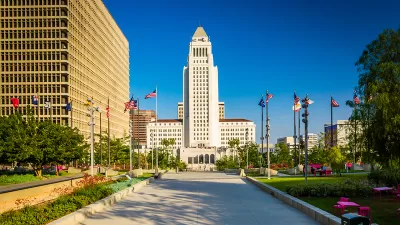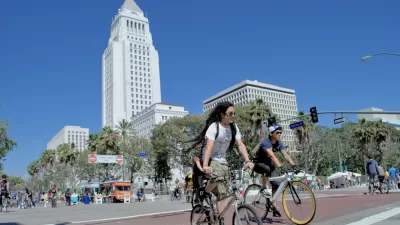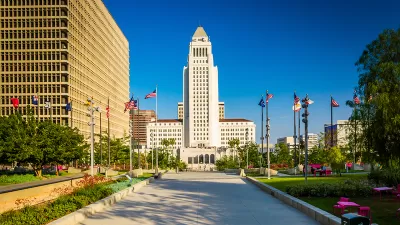A Los Angeles Times investigation reveals that the city of Los Angeles' might not have revealed every layer of ethics violation committed by Michael LoGrande after he left the Department of City Planning in 2016.

David Zahniser and Emily Alpert Reyes report on a scandal in Los Angeles involving the former director of the Los Angeles Department of City Planning.
"Former planning director Michael LoGrande recently admitted to violating city ethics laws by lobbying planning department officials just months after leaving his job running the agency," according to Zahniser and Reyes.
A Los Angeles Times investigation revealed another layer, however: "Three of the four violations took place in early 2016, while LoGrande was under contract with the city to provide 'strategic advice' on various planning issues, a Times review of documents found."
That consulting work for the city was not mentioned in the city's enforcement case against LoGrande, according to Zahniser and Reyes.
Lo Grande has already been fined $281,250, "the largest penalty levied against a current or former city employee" and the largest fine ever for a revolving door case in the city of Los Angeles.
The article includes more details on the work LoGrande was performing while working both as a lobbyist and a consultant for the city.
The Code of Ethics and Professional Conduct published by the American Institute of Certified Planners does not specifically mention lobbying, nor any revolving door policy, but there's plenty of language that describes the same conduct to be found in the code. It's probably worth a look for a reminder about where the profession draws its lines—separate from where cities and other forms of government draw their lines.

Alabama: Trump Terminates Settlements for Black Communities Harmed By Raw Sewage
Trump deemed the landmark civil rights agreement “illegal DEI and environmental justice policy.”

Planetizen Federal Action Tracker
A weekly monitor of how Trump’s orders and actions are impacting planners and planning in America.

Why Should We Subsidize Public Transportation?
Many public transit agencies face financial stress due to rising costs, declining fare revenue, and declining subsidies. Transit advocates must provide a strong business case for increasing public transit funding.

Understanding Road Diets
An explainer from Momentum highlights the advantages of reducing vehicle lanes in favor of more bike, transit, and pedestrian infrastructure.

New California Law Regulates Warehouse Pollution
A new law tightens building and emissions regulations for large distribution warehouses to mitigate air pollution and traffic in surrounding communities.

Phoenix Announces Opening Date for Light Rail Extension
The South Central extension will connect South Phoenix to downtown and other major hubs starting on June 7.
Urban Design for Planners 1: Software Tools
This six-course series explores essential urban design concepts using open source software and equips planners with the tools they need to participate fully in the urban design process.
Planning for Universal Design
Learn the tools for implementing Universal Design in planning regulations.
Caltrans
Smith Gee Studio
Institute for Housing and Urban Development Studies (IHS)
City of Grandview
Harvard GSD Executive Education
Toledo-Lucas County Plan Commissions
Salt Lake City
NYU Wagner Graduate School of Public Service





























